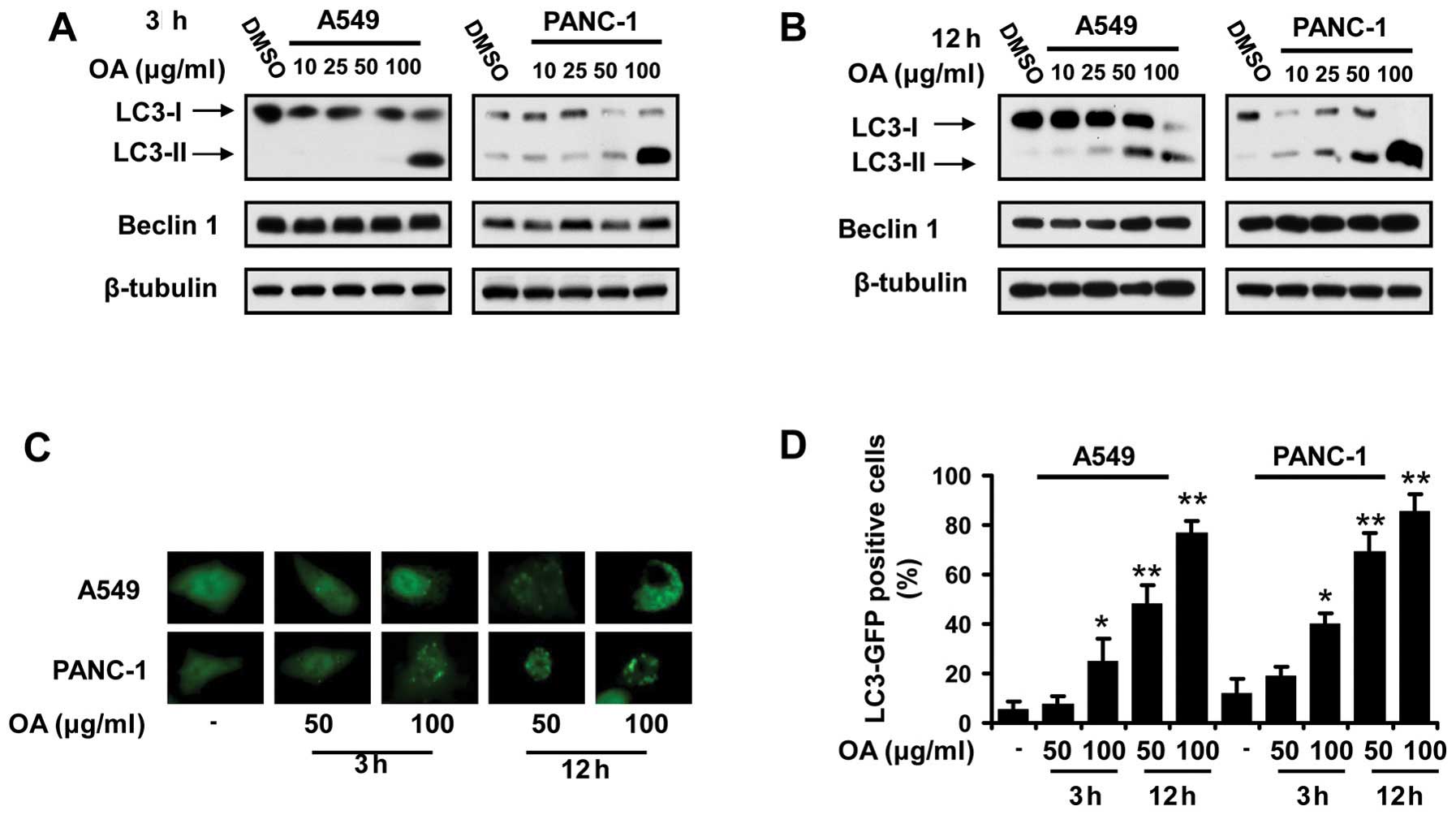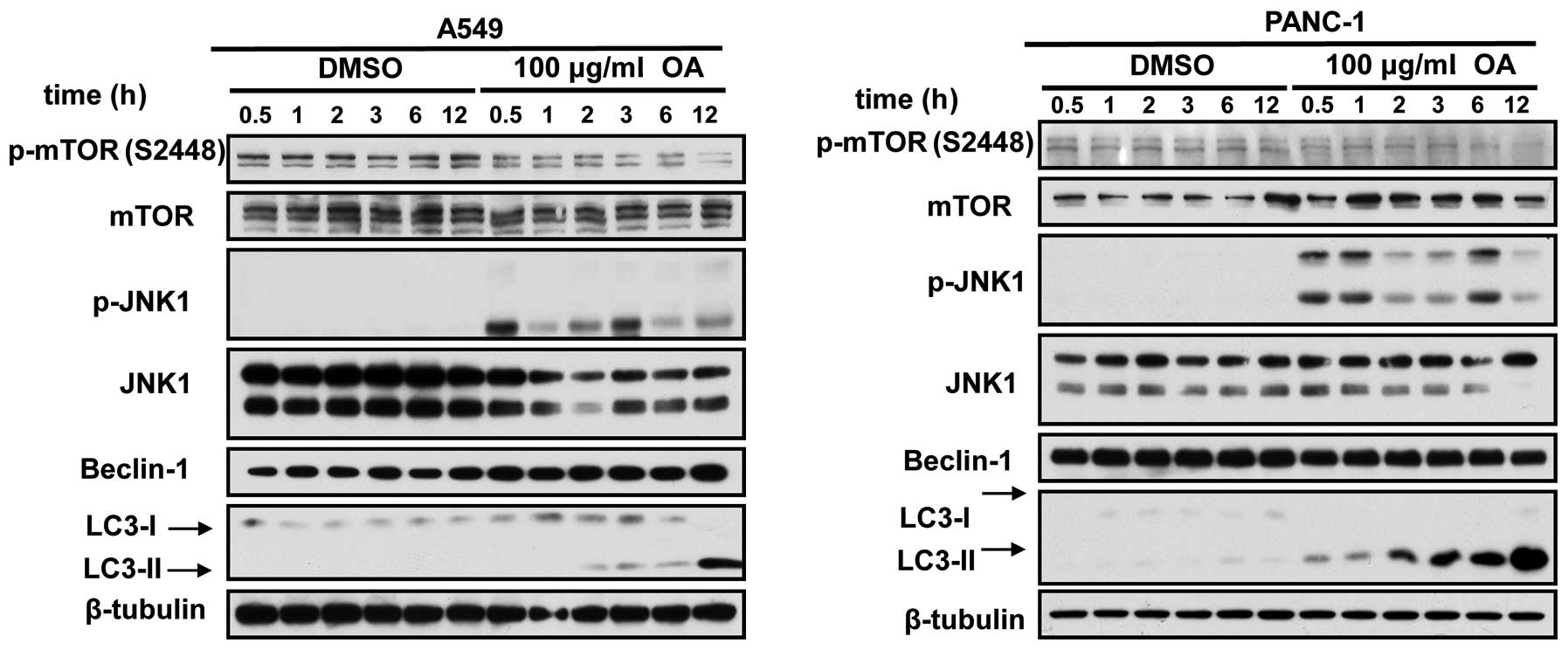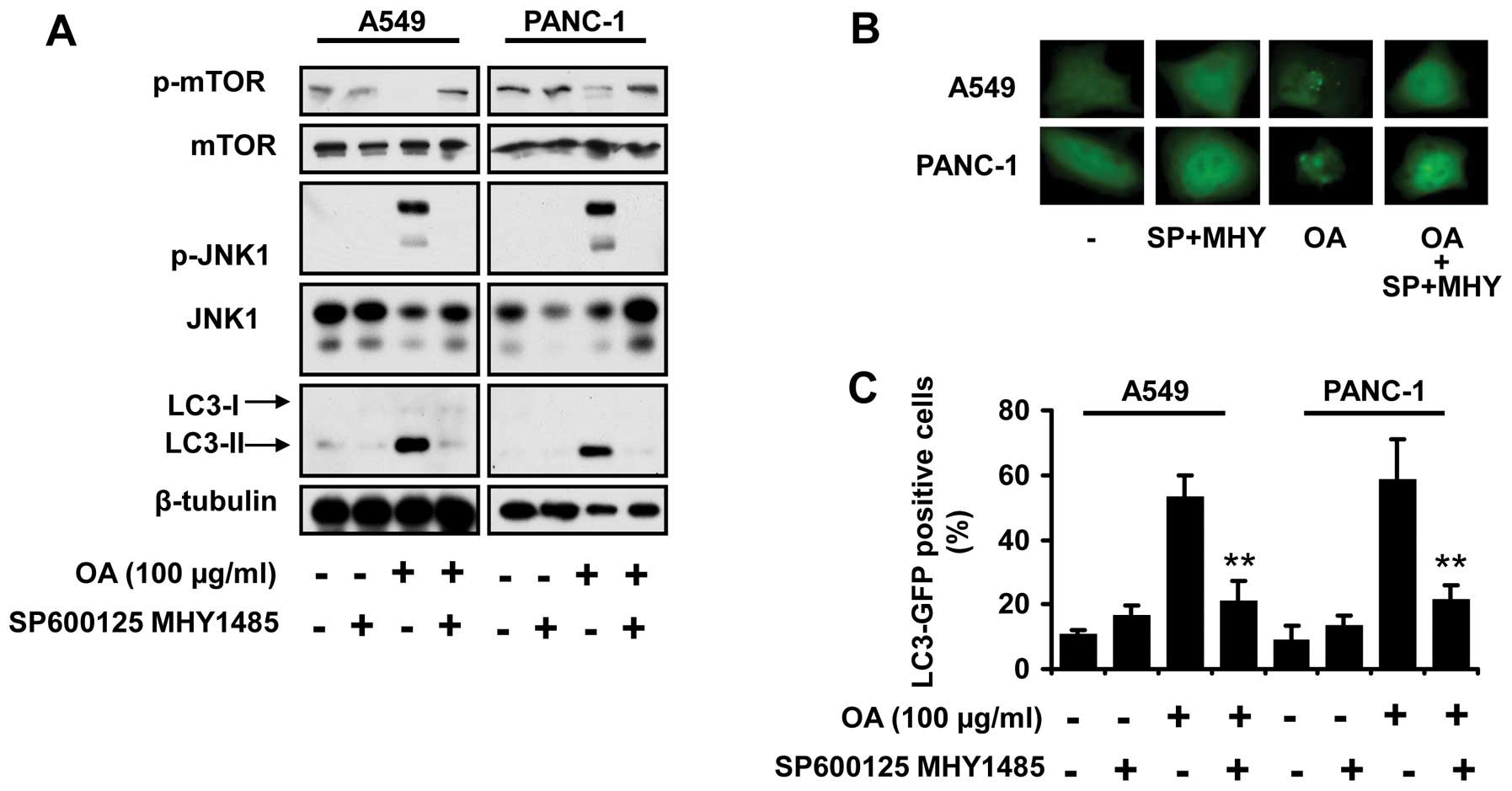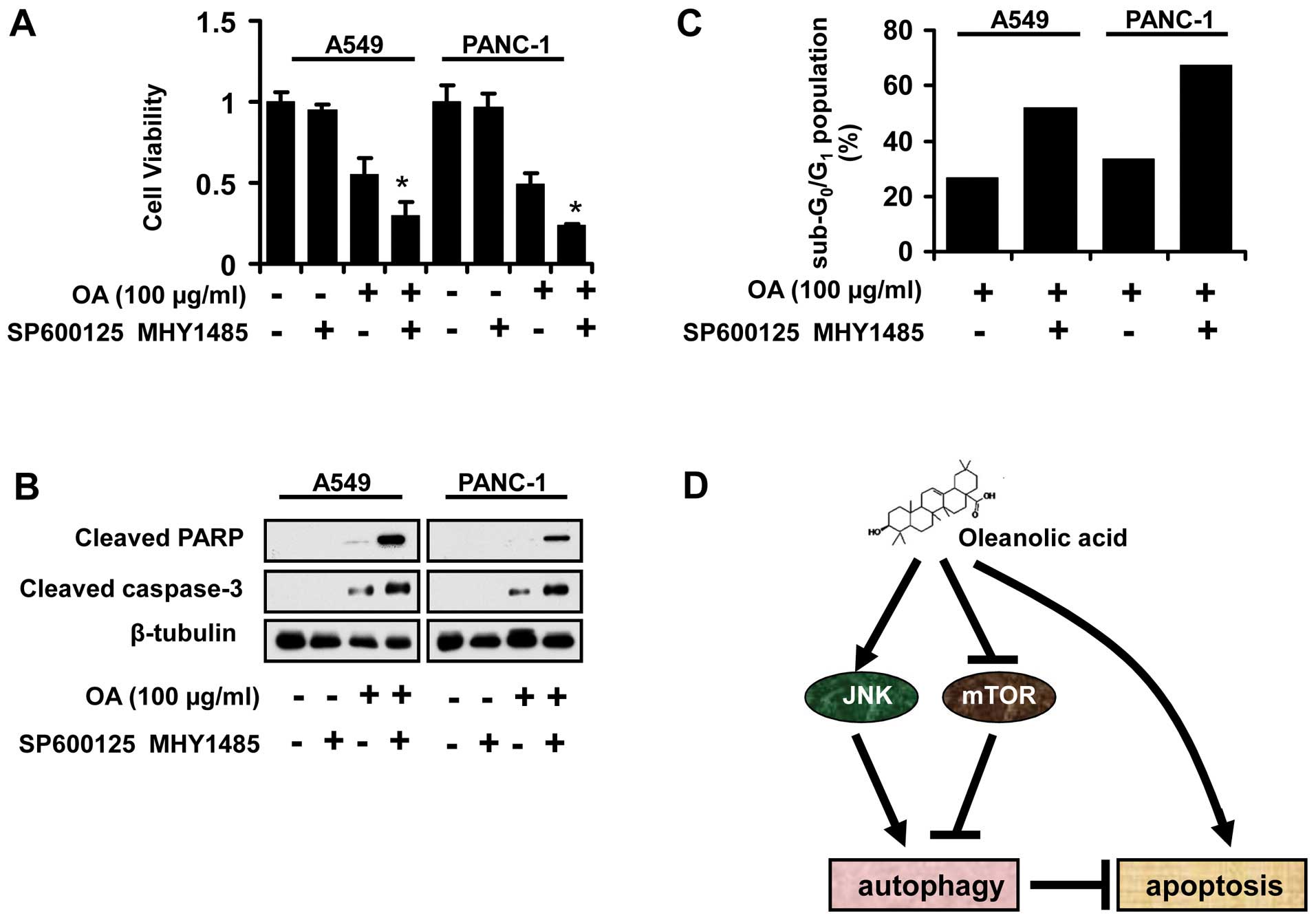|
1
|
Pollier J and Goossens A: Oleanolic acid.
Phytochemistry. 77:10–15. 2012. View Article : Google Scholar
|
|
2
|
Liby KT, Yore MM and Sporn MB:
Triterpenoids and rexinoids as multifunctional agents for the
prevention and treatment of cancer. Nat Rev Cancer. 7:357–369.
2007. View
Article : Google Scholar : PubMed/NCBI
|
|
3
|
Petronelli A, Pannitteri G and Testa U:
Triterpenoids as new promising anticancer drugs. Anticancer Drugs.
20:880–892. 2009. View Article : Google Scholar : PubMed/NCBI
|
|
4
|
Chakravarti B, Maurya R, Siddiqui JA, et
al: In vitro anti-breast cancer activity of ethanolic extract of
Wrightia tomentosa: role of pro-apoptotic effects of
oleanolic acid and urosolic acid. J Ethnopharmacol. 142:72–79.
2012. View Article : Google Scholar : PubMed/NCBI
|
|
5
|
Wei J, Liu M, Liu H, et al: Oleanolic acid
arrests cell cycle and induces apoptosis via ROS-mediated
mitochondrial depolarization and lysosomal membrane
permeabilization in human pancreatic cancer cells. J Appl Toxicol.
33:756–765. 2012. View
Article : Google Scholar
|
|
6
|
Zhang X, Chen LX, Ouyang L, Cheng Y and
Liu B: Plant natural compounds: targeting pathways of autophagy as
anti-cancer therapeutic agents. Cell Prolif. 45:466–476. 2012.
View Article : Google Scholar : PubMed/NCBI
|
|
7
|
Livesey KM, Tang D, Zeh HJ and Lotze MT:
Autophagy inhibition in combination cancer treatment. Curr Opin
Investig Drugs. 10:1269–1279. 2009.PubMed/NCBI
|
|
8
|
Wei Y, Pattingre S, Sinha S, Bassik M and
Levine B: JNK1-mediated phosphorylation of Bcl-2 regulates
starvation-induced autophagy. Mol Cell. 30:678–688. 2008.
View Article : Google Scholar : PubMed/NCBI
|
|
9
|
Wang X, Bai H, Zhang X, et al: Inhibitory
effect of oleanolic acid on hepatocellular carcinoma via
ERK-p53-mediated cell cycle arrest and mitochondrial-dependent
apoptosis. Carcinogenesis. 34:1323–1330. 2013. View Article : Google Scholar : PubMed/NCBI
|
|
10
|
Guo G, Yao W, Zhang Q and Bo Y: Oleanolic
acid suppresses migration and invasion of malignant glioma cells by
inactivating MAPK/ERK signaling pathway. PLoS One. 8:e720792013.
View Article : Google Scholar : PubMed/NCBI
|
|
11
|
Aoki H, Takada Y, Kondo S, Sawaya R,
Aggarwal BB and Kondo Y: Evidence that curcumin suppresses the
growth of malignant gliomas in vitro and in vivo through induction
of autophagy: role of Akt and extracellular signal-regulated kinase
signaling pathways. Mol Pharmacol. 72:29–39. 2007. View Article : Google Scholar : PubMed/NCBI
|
|
12
|
Eom JM, Seo MJ, Baek JY, et al:
Alpha-eleostearic acid induces autophagy-dependent cell death
through targeting AKT/mTOR and ERK1/2 signal together with the
generation of reactive oxygen species. Biochem Biophys Res Commun.
391:903–908. 2010. View Article : Google Scholar : PubMed/NCBI
|
|
13
|
Rasul A, Yu B, Zhong L, Khan M, Yang H and
Ma T: Cytotoxic effect of evodiamine in SGC-7901 human gastric
adenocarcinoma cells via simultaneous induction of apoptosis and
autophagy. Oncol Rep. 27:1481–1487. 2012.PubMed/NCBI
|
|
14
|
Filippi-Chiela EC, Villodre ES, Zamin LL
and Lenz G: Autophagy interplay with apoptosis and cell cycle
regulation in the growth inhibiting effect of resveratrol in glioma
cells. PLoS One. 6:e208492011. View Article : Google Scholar : PubMed/NCBI
|
|
15
|
Zhao S, Ma CM, Liu CX, et al: Autophagy
inhibition enhances isobavachalcone-induced cell death in multiple
myeloma cells. Int J Mol Med. 30:939–944. 2012.PubMed/NCBI
|
|
16
|
Wang K, Liu R, Li J, et al: Quercetin
induces protective autophagy in gastric cancer cells: involvement
of Akt-mTOR- and hypoxia-induced factor 1α-mediated signaling.
Autophagy. 7:966–978. 2011.PubMed/NCBI
|
|
17
|
Mehrpour M, Esclatine A, Beau I and
Codogno P: Overview of macroautophagy regulation in mammalian
cells. Cell Res. 20:748–762. 2010. View Article : Google Scholar : PubMed/NCBI
|
|
18
|
Xavier CP, Lima CF, Pedro DF, Wilson JM,
Kristiansen K and Pereira-Wilson C: Ursolic acid induces cell death
and modulates autophagy through JNK pathway in apoptosis-resistant
colorectal cancer cells. J Nutr Biochem. 24:706–712. 2013.
View Article : Google Scholar : PubMed/NCBI
|
|
19
|
Wang X, Ye XL, Liu R, et al: Antioxidant
activities of oleanolic acid in vitro: possible role of Nrf2 and
MAP kinases. Chem Biol Interact. 184:328–337. 2010. View Article : Google Scholar : PubMed/NCBI
|
|
20
|
Zou W, Yue P, Khuri FR and Sun SY:
Coupling of endoplasmic reticulum stress to CDDO-Me-induced
up-regulation of death receptor 5 via a CHOP-dependent mechanism
involving JNK activation. Cancer Res. 68:7484–7492. 2008.
View Article : Google Scholar : PubMed/NCBI
|
|
21
|
Zhou R, Zhang Z, Zhao L, et al: Inhibition
of mTOR signaling by oleanolic acid contributes to its anti-tumor
activity in osteosarcoma cells. J Orthop Res. 29:846–852. 2011.
View Article : Google Scholar : PubMed/NCBI
|



















